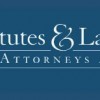
Specializing in Personal Injury, Real Estate & Commercial Transactions, Business Law, Tax Law, Estate Planning & Successions. Since founded in 2005, Stutes & Lavergne has been serving Lake Charles, Sulphur, Moss Bluff, Jennings, Hackberry, Cameron, and other areas with proven success. We are consistent, patient, and professional, giving each new case the attention it deserves by walking you through each step of the process.
With Stutes & Lavergne, you should expect the best. Your comfort level with the case is a priority to us, and we take the time to get to know you and what is important to you. We will direct your case to a resolution that is tailored to accomplish your individual goals, both in the current matter and in the years to come.
With Stutes & Lavergne, you should expect the best. Your comfort level with the case is a priority to us, and we take the time to get to know you and what is important to you. We will direct your case to a resolution that is tailored to accomplish your individual goals, both in the current matter and in the years to come.
Services
Our main goal is to ensure that large companies don't take advantage of people who were involved in serious accidents. As injury attorneys, we all too often see people getting mistreated by insurance companies and other large corporations. We fight for our clients' to ensure that they get fully compensated to help alleviate their burdens.
Stutes & Lavergne, LLC, routinely represents both state and local tax administrators in tax collection proceedings and refund suits. By offering audit review, case evaluations, opinion letters on select issues, and full trial and appellate representation, our experienced state and local tax attorneys handle tax issues from start to finish.
At Stutes & Lavergne, we often guide small business owners as they seek to form and organize a venture, providing invaluable direction to a wise strategy that will protect the interests of the business far into the future. We offer foresight to proactively identify potential issues, creating solutions in advance to avoid costly obstacles and violations.
You can't take it with you when you die, but you can direct the transfer of your assets upon death through a well-considered estate plan. Estate plans commonly consist of a will, power of attorney, and health care power of attorney. A trust can also be a useful tool in estate planning. The only way to ensure that your assets get to the people or organizations you care about most, you should have an estate plan in place.
A well-considered and properly drafted will is the best way to ensure that your assets are transferred in accordance with your wishes. Without a will, most people's assets will pass to their children. A surviving spouse would have only a limited right to manage the deceased spouse's community property, and no rights to separate property.

